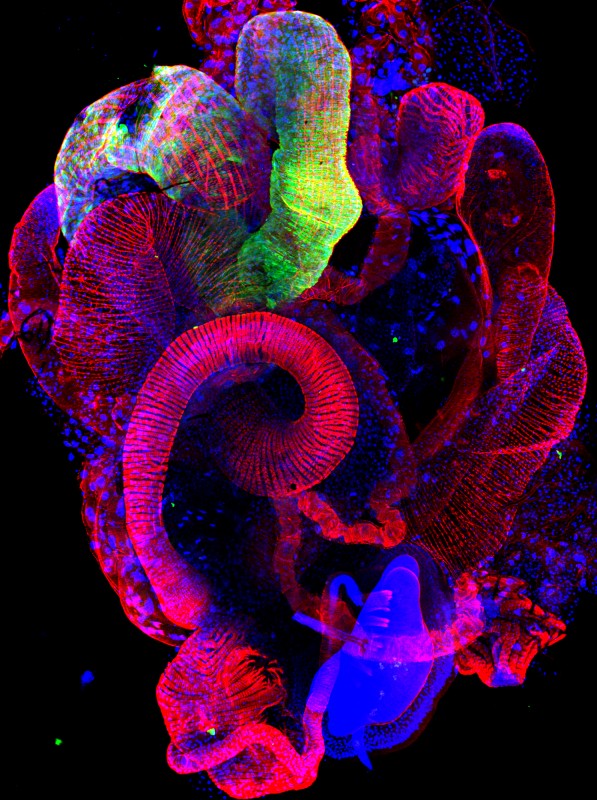By Sophie Arthur
August 8, 2019
Time to read: 4 minutes
What makes a male and what makes a female? Is it just our sex organs, or is it more than that?
For hundreds of years, the humble fruit fly has been used as a model organism in biomedical research, and has been responsible for some of the most significant advances in the field of medicine. But historically there has been a clear distinction between flies and humans. Everything that has been described as sexually dimorphic – all the differences between a male and female of the same species beyond the sexual organs – in a human was thought to be due to hormones, whereas in flies it was due to sex chromosomes. However, the latest research from the Gut Signalling and Metabolism group here at the MRC LMS blurs that distinction somewhat.
Exploring sex differences in flies
The Gut Signalling and Metabolism group led by Professor Irene Miguel-Aliaga are interested in the differences between males and females. Previously, the group have shown that the stem cells in the gut were different between males and females. Female stem cells divided more, which affected the gut’s ability to grow and the probability of developing tumours. During the course of these experiments, the group also noticed that genes with potential roles in carbohydrate metabolism were much more active in male intestines. In their latest research, the group wanted to work out why.
Research published on 8 August in Cell has uncovered how the testes talk to the gut to obtain a molecule they need to maintain sperm production. This latest report shows how the testes communicate to a portion of the gut and makes it ‘male’. The ‘masculinised’ gut portion has increased expression of genes associated with carbohydrate metabolism, which allows it to produce higher amounts of a molecule called citrate; a product of sugar metabolism. The gut portion hears the request of the testes, makes more citrate and sends it straight back to the testes.

These findings are particularly exciting when you know that the male prostate also makes a lot of citrate that could be very important for sperm maturation.
By exploring these sex differences in flies, this latest research has shown that the mechanism involved is very different from the one that made the stem cells ‘male’ or ‘female’. While the stem cells have a sexual identity of their own, this report shows that the digestive cells in the same organ can acquire their sexual identity through signals produced by the adjacent sex organs. This goes to show that it is not just the sex chromosomes that are intrinsically controlling sex differences in flies; cell extrinsic signals can also do it.
Irene Miguel-Aliaga, senior author on this paper, discussed her excitement for this finding:

“My group are interested in the basic science of sex differences, and I am particularly fascinated by the 3D arrangement of organs. Not only is the communication between these two organs exciting, but the fact that they are also in such close physical proximity in males is even more incredible.”
Discussing the next steps for this work, Irene said:
“We want to explore whether communication between adjacent organs is something that is unique between the testes and this portion of the gut, or if in fact this type of communication is more widespread throughout the body. We are also exploring whether there is the same communication occurring in females. Does the gut talk to the ovaries? We are finding that the communication is very different and doesn’t involve citrate. We are also curious about whether our own organs use citrate to communicate. We have a lot of citrate in our bloodstream, but we know little about where it comes from or where it goes.”
‘Sex differences in intestinal carbohydrate metabolism promote food intake and sperm maturation’ was published in Cell on 8 August. Read the article here: https://www.cell.com/cell/fulltext/S0092-8674(19)30796-2